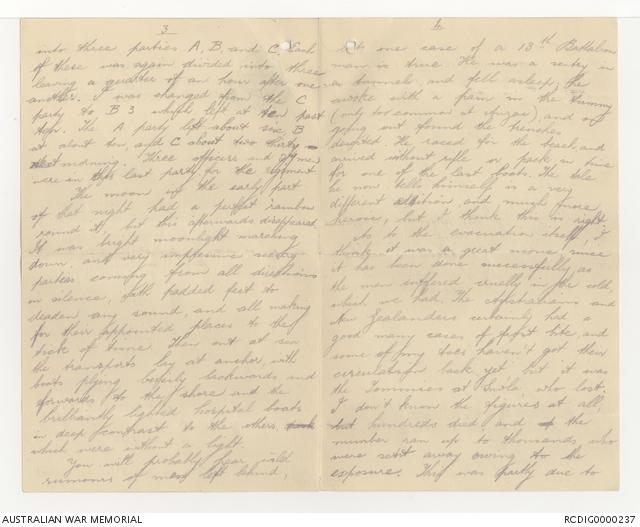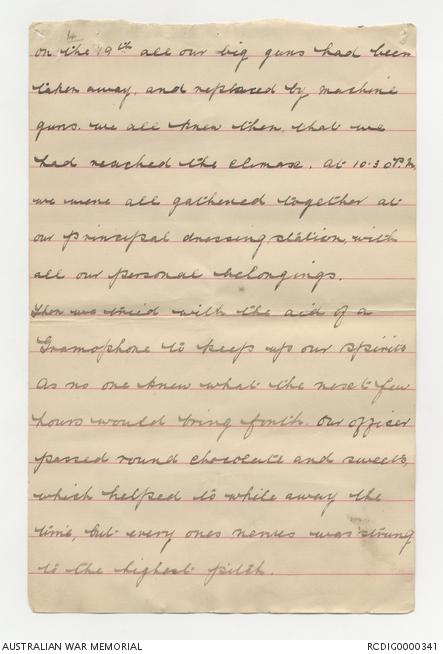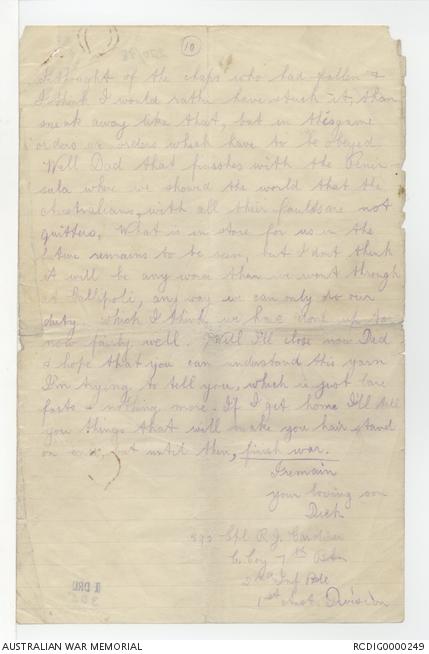On this day...20 December 1915
On 20 December 1915, Private John Kingsley Gammage of the 1st Infantry Battalion wrote in his diary, "This concludes a real experience that money could not buy with an enemy that fought fairly and clean". Gammage was one of the last 10,000 Australian troops remaining at Anzac Cove. These men departed Anzac Cove during the night of Sunday 19 December through into the early hours of Monday 20 December 1915. The preparations for their departure had been carefully planned down to the finest details. The plan was that the remaining Australian and New Zealand units were to be divided into A, B and C parties where the C party would be the last to leave. Embarkation points were set up at Watson's Pier at Anzac Cove and Walker's, Williams and Milo's piers at North Beach.
It is the personal stories and experiences of the soldiers involved in the evacuation that reveals what happened when plans were moved into action. Major Nathaniel Dunbar Barton of the 7th Light Horse Regiment describes the scene in a letter to his mother on 22 December 1915, It was bright moonlight marching down, and very impressive seeing parties coming from all directions in silence, with padded feet to deaden any sound, and all making for their appointed places to the tick of time.
David Watson Izatt who was in the last party of the Australian Army Medical Corps to leave the peninsula that night, afterwards wrote everyone's nerves were strung to the highest pitch. The uncertainty of what would happen played on their minds although they enlisted the help of a gramaphone, chocolates and sweets to while away the time until they recieved the signal to move.
Miraculously, there were no fatalities or people left behind although there were some close calls. Lieutenant George Shaw of the 28th Battalion Machine Gunners heard voices behind where he was manning a gun and on investigating discovered departing members of the 20th Infantry Battalion. The order to depart had been brought forward by 3.10am but he had not recieved the message. Instead of leaving, he returned to the gun pit and unloaded the gun that he had been manning. Returning fire from the Turkish trenches shattered the gun but he was not hurt in the exchange. Izatt comments that the only injuries sustained that night were a man who had his leg run over by a big gun and another who was shot in the chest. Barton also tells the story of a 13th Battalion sentry who fell asleep and ran to the beach just as the last boats were leaving.
Diary entries and letters from this period reveal a myriad of emotions and opinions on the departure from the peninsula. Some simply accepted it as their lot for being a soldier and that there was a good reason behind the decision. Others were noticeably upset. Many had mixed emotions as illustrated by the final comments of Sergeant Reginald Job Gardiner in a letter to his father, To conclude, I don't think any one was sorry to leave the Peninsula, although when I passed the cemetery on the way to the beach I thought of the chaps who had fallen and I think I would rather have stuck it, then sneak away like that, but in this game orders are orders which have to be obeyed.
These are just some of the stories of the evacuation from Gallipoli found in the diaries and letters within collections digitised as part of the Memorial's ANZAC Connections project.


